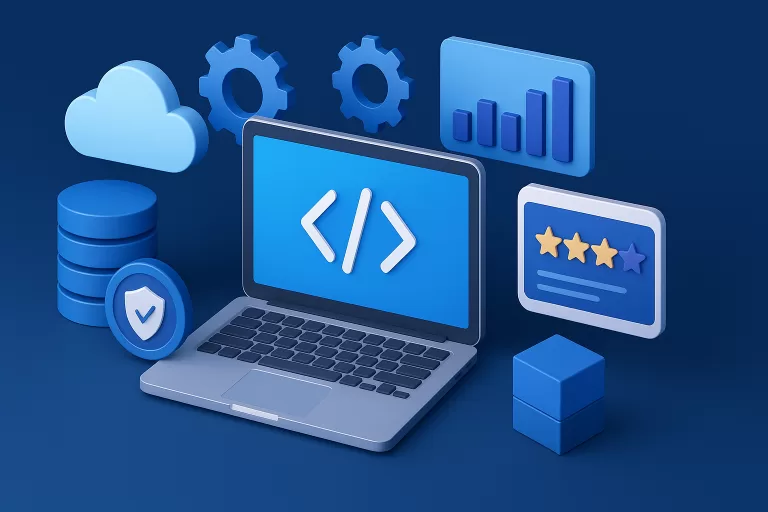Introduction
In today’s interconnected, fast-paced digital economy, the term “software company” is no longer confined to Silicon Valley startups or tech giants. It refers to a broad ecosystem of businesses that design, develop, maintain, and market software products and services — from enterprise ERP systems and mobile apps to cloud computing platforms and AI-powered analytics.
But what exactly defines a software company? What do they do, how do they operate, and why are they so pivotal in shaping the future? In this comprehensive article, we explore the anatomy, functions, and evolution of software companies — from startup garages to global leaders — and how their innovation drives every industry forward.
1. What Is a Software Company?
A software company is an organization that creates and sells software as its primary product. This software can be:
System Software (e.g., operating systems, servers)
Application Software (e.g., accounting systems, CRM platforms)
Development Tools (e.g., IDEs, compilers, frameworks)
Cloud Services & APIs
Custom Solutions
Software companies may follow different business models such as:
SaaS (Software as a Service)
On-Premises Software
Freemium or Subscription Models
Custom Development Services
2. Key Departments in a Software Company
The typical departments in a software company include:
Product Development: Programmers, testers, UI/UX designers
Project Management: Agile or SCRUM-based workflows
Sales and Marketing: SEO, content strategy, demos, lead generation
Customer Success & Support: Ticketing, onboarding, training
Business Analysis: Understanding client needs and market gaps
DevOps and Cloud Infrastructure: CI/CD, cloud hosting, system scalability
3. Core Services Offered by Software Companies
Software companies may provide:
Enterprise Resource Planning (ERP) Systems
Customer Relationship Management (CRM) Tools
HR and Payroll Systems
Mobile and Web App Development
Cloud Hosting & Maintenance
Cybersecurity & Compliance Services
API Development and Integration
AI & Machine Learning Solutions
These services are tailored to various industries such as finance, education, real estate, healthcare, and logistics.
4. Why Software Companies Are Critical for Digital Transformation
No digital transformation is possible without software companies. They provide the backbone for automating workflows, managing large data sets, ensuring regulatory compliance, and delivering customer-centric innovations.
Whether it’s automating payroll, tracking inventory, or creating personalized shopping experiences, software solutions are the invisible engines powering businesses in the 21st century.
5. Types of Software Companies
There are three main types:
a. Product-Based Companies
Focus on developing one or more core software products.
Example: Microsoft, Adobe, Atlassian
b. Service-Based Companies
Build custom solutions for clients based on their needs.
Example: Infosys, TCS, Accenture
c. Hybrid Companies
Offer both products and custom services.
This model allows more flexibility and scalability.
6. The Rise of SaaS and Cloud-Based Software Companies
Cloud infrastructure has revolutionized software companies. With SaaS, clients no longer need to install software on local machines — everything is hosted online, updated automatically, and billed monthly or annually.
Top SaaS advantages:
Lower upfront costs
Scalability
Anytime, anywhere access
Enhanced security
Continuous updates
7. Challenges Facing Software Companies Today
While the opportunities are vast, software companies face real challenges:
Security vulnerabilities
Talent shortage
Rising customer expectations
Regulatory compliance (e.g., GDPR, HIPAA)
Global competition
Overcoming these challenges requires a mix of technical expertise, agile management, and constant innovation.
8. How to Choose the Right Software Company for Your Business
When selecting a software company, consider:
Experience in your industry
Customization and scalability
UI/UX and performance standards
Integration capabilities
Customer support and training
Cloud or hybrid infrastructure
9. The Future of Software Companies
The future belongs to companies that:
Embrace AI and automation
Deliver low-code/no-code platforms
Invest in cybersecurity
Adopt green computing and sustainability
Focus on customer personalization
These trends will shape not just how software is built but how it’s delivered and consumed.
10. How Mozon Technologies Is Pioneering the Software Industry in the Middle East
Mozon Technologies is a leading software company in Jordan offering a wide range of business software solutions tailored to the needs of enterprises across industries. From ERP and HR systems to e-invoicing and real estate management, Mozon’s solutions are modular, scalable, and aligned with regional regulatory standards.
Key advantages of Mozon’s systems:
Cloud and on-prem deployment
Arabic and English interfaces
Official integration with Jordan’s e-invoicing platform (Fawtara)
Comprehensive training and support
Whether you’re a small business or a government entity, Mozon delivers enterprise-grade software that evolves with your organization.
FAQs
What is the difference between a software product company and a software service company?
A product company sells packaged software products, while a service company builds tailored solutions for clients.
How do software companies make money?
They earn via licenses, subscriptions, custom development fees, maintenance, and support contracts.
What skills do you need to start a software company?
Key skills include software development, project management, sales & marketing, and a clear business model.
What are the most common software company business models?
Common models include SaaS, perpetual licensing, freemium, open-source support, and custom development.
Is it profitable to start a software company?
It can be highly profitable with the right model, market fit, and go-to-market strategy.
Conclusion
A software company is more than a group of developers. It’s a partner in innovation a strategic force that empowers organizations to run smarter, faster, and more efficiently.
If you’re searching for a software partner that understands your business, speaks your language, and delivers powerful, localized solutions look no further than companies like Mozon Technologies.





